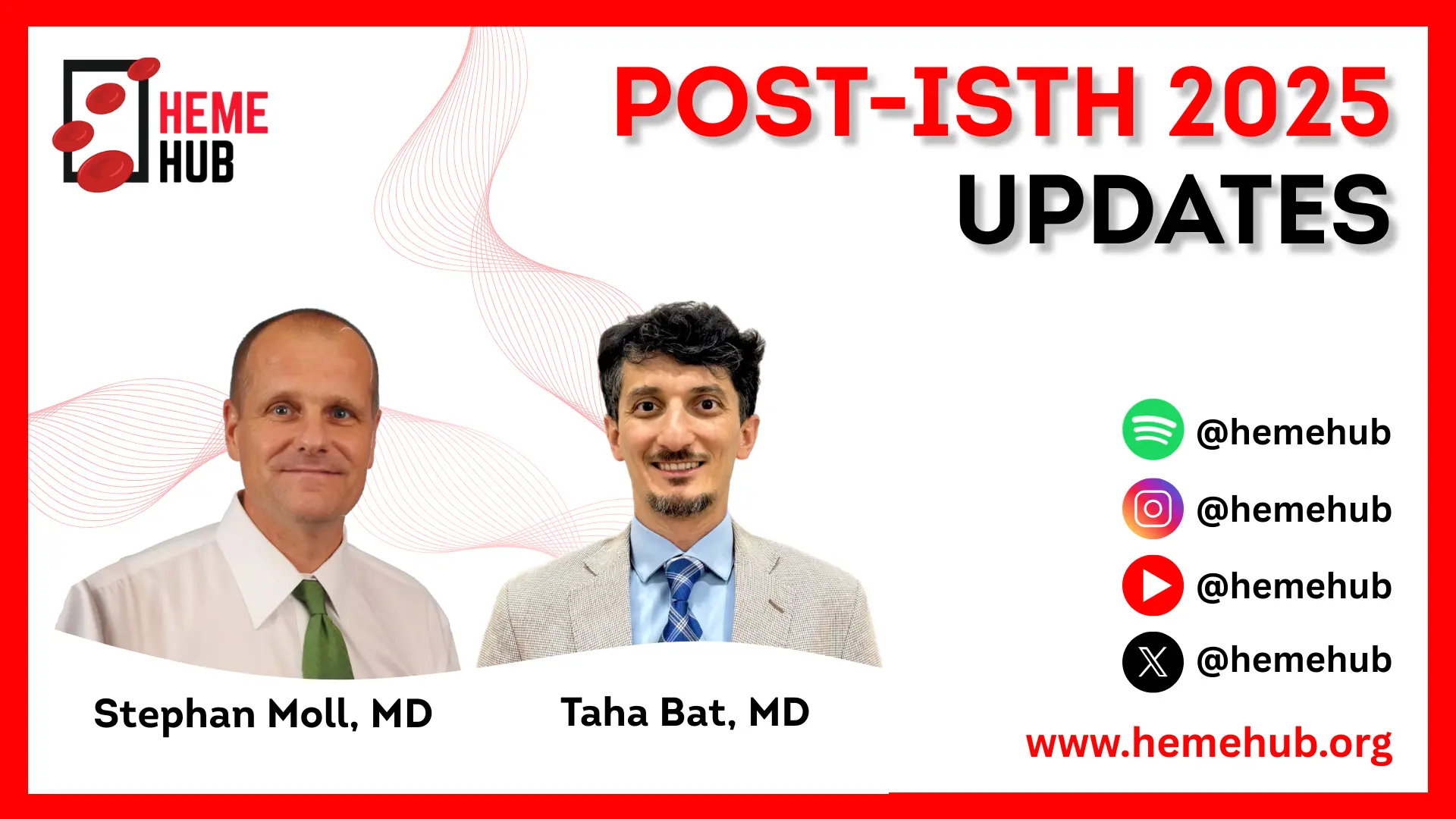Conferences
Conference presentations and educational content covering various hematological topics and research updates
3 conference videos available

ASH 2024 Update: Aplastic Anemia, Bleeding Disorders, Thrombosis, and ITP
This video provides a comprehensive update on the latest advancements and research presented at ASH 2024, focusing on aplastic anemia, bleeding disorders, thrombosis, and immune thrombocytopenia (ITP). The session is co-hosted by Yu-Min Shen, MD from UT Southwestern and Ibrahim Ibrahim, MD from UT Southwestern, with Taha Bat, MD initiating the discussion. This ASH 2024 update covers significant advancements across various hematological conditions including new research on eltrombopag's role as frontline therapy, studies on clonal hematopoiesis dynamics, advances in hemophilia treatment, insights into VTE management, and updates on ITP therapies. The discussion encompasses both established and emerging treatment modalities across multiple hematological specialties.
Key Learning Points:
- Eltrombopag significantly improves long-term outcomes and survival for severe aplastic anemia when added to standard immunosuppressive treatment
- Clonal hematopoiesis in aplastic anemia shows specific mutational dynamics post-immunosuppression, with PIGA variants linked to hemolytic PNH
- New TPO agonists like avatrombopag and homatropack are promising for treatment-naive severe aplastic anemia patients
- +9 more points...

Post 2025 ISTH Updates
In this session, Stephan Moll, MD and Taha Bat, MD discuss the latest updates and case discussions from the 2025 International Society on Thrombosis and Haemostasis (ISTH) meeting. They review emerging evidence and guidelines around diagnosis and management of rare coagulopathy (blood clotting) conditions, share clinical cases to illustrate challenges, and suggest approaches to integrate new research into practice.
Key Learning Points:
- New approaches in diagnostics are being emphasized, including more precise assays and biomarkers, to help distinguish rare coagulopathies more reliably and earlier
- Updated treatment options and clinical trials are pushing forward, with more targeted therapies (e.g. novel anticoagulants, replacement factors) being explored for specialized conditions.
- The presenters use real clinical cases to highlight diagnostic dilemmas, therapeutic decision-making, and individualization of care, reinforcing that one size doesn’t fit all.
- +2 more points...

POST ASH 2023 Annual Meeting
This session featuring Yu-Min Shen, MD; Ibrahim Ibrahim, MD; and Taha Bat, MD, offered a comprehensive analysis of key hematology advances presented at the 2023 ASH Annual Meeting, with a special focus on bone marrow failure syndromes such as aplastic anemia (AA), paroxysmal nocturnal hemoglobinuria (PNH), and related clonal disorders. The panel emphasized how the field is rapidly shifting toward precision medicine, integrating molecular diagnostics and immune characterization into everyday clinical decision-making. A central theme was the expanding therapeutic landscape beyond traditional immunosuppressive therapy (IST). Emerging data on novel complement inhibitors, thrombopoietin receptor agonists, and targeted immune modulatorsare redefining treatment pathways and allowing for individualized regimens based on patient-specific molecular profiles and risk factors. The experts discussed how these developments may reduce relapse rates, delay clonal evolution, and improve quality of life for patients. Another focal point was the timing and optimization of hematopoietic stem cell transplantation (HSCT). The panelists noted that earlier consideration of HSCT—particularly in younger, high-risk, or treatment-refractory patients—can lead to superior survival outcomes. Advances in donor matching, reduced-intensity conditioning, and supportive care are making transplant a safer and more accessible option worldwide. The discussion also highlighted the growing role of genomic testing in identifying patients at risk for clonal progression to myelodysplastic syndromes (MDS) or acute myeloid leukemia (AML). Routine incorporation of NGS panels, flow cytometry, and cytogenetic studies was encouraged to guide prognosis and therapeutic selection. Finally, the panel addressed real-world barriers to adopting these novel therapies, including cost, access, and health equity challenges. They stressed the importance of multidisciplinary collaboration and data sharing to ensure that innovation translates into measurable improvements in patient outcomes globally. Overall, the session reflected the momentum in translational hematology, bridging laboratory discoveries with clinical practice, and underscored the collective effort to refine diagnosis, enhance treatment precision, and improve long-term survivorship in bone marrow failure disorders.
Key Learning Points:
- The panel highlighted significant advances in the understanding and management of aplastic anemia, PNH, and related marrow failure syndromes, emphasizing the role of clonal evolution and immune dysregulation.
- Novel agents such as complement inhibitors and targeted therapies are changing treatment paradigms, allowing for personalized approaches beyond standard ATG and cyclosporine
- Data presented at ASH 2023 reinforced the importance of considering early hematopoietic stem cell transplantation in eligible patients to improve long-term survival outcomes
- +2 more points...